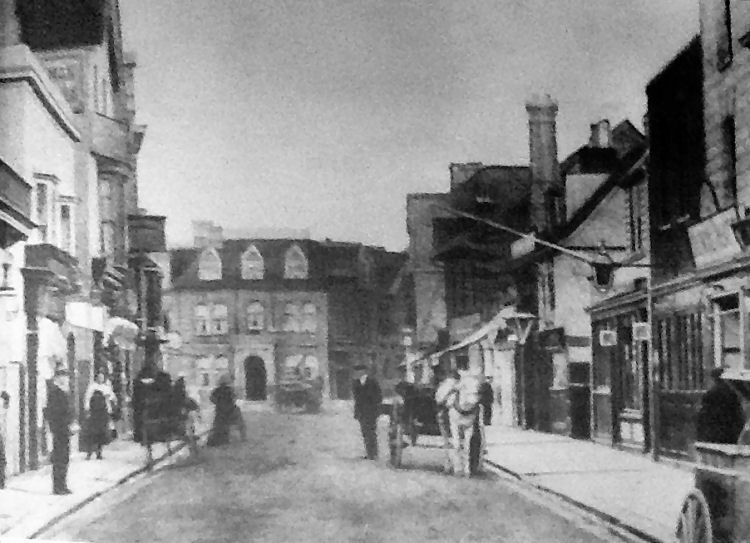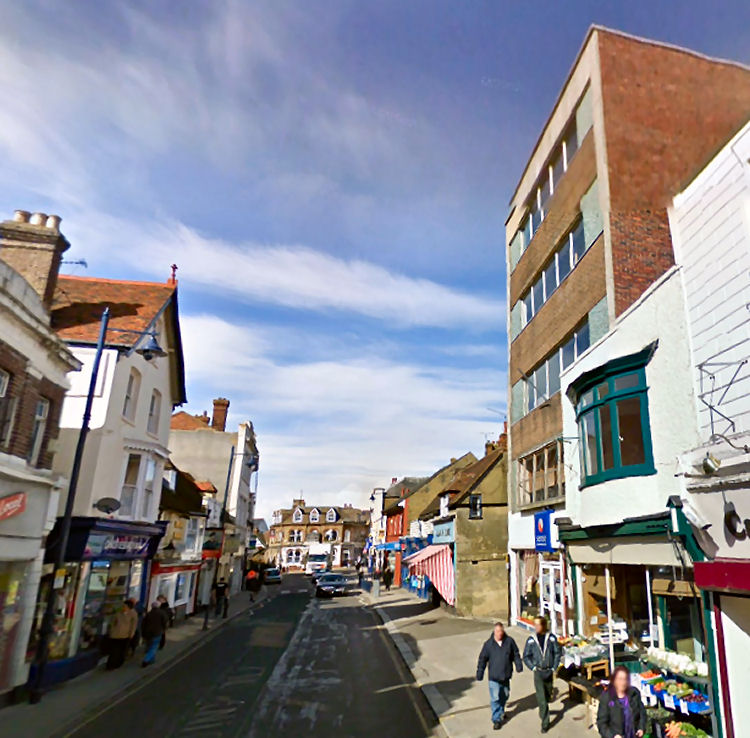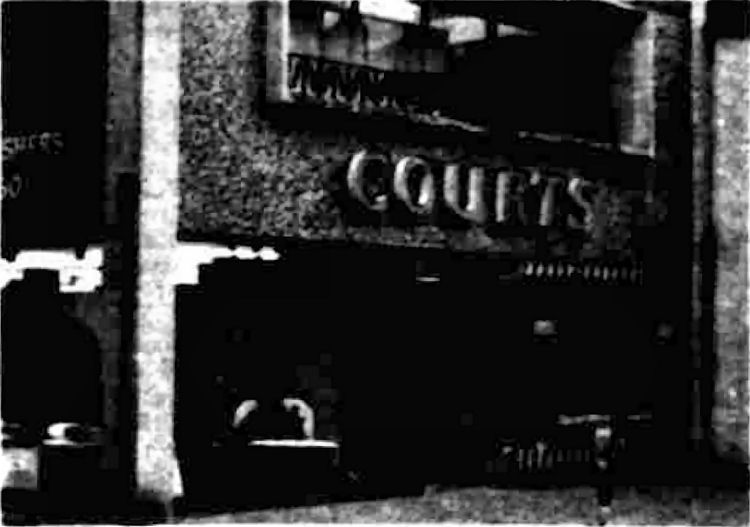|
21 High Street
Whitstable

Shown in the above photo is the Whitstable U.D.C. Fire Station on the
extreme right, with the gas lamp outside. Then the "Hoy Endeavour," that
later became Courts and then a charity shop. Next to that is Shades, the
butchers. Next the "Jolly
Sailor." On the left is the "Royal
Navy Reserve." |

Above Google image, March 2009. The location in question being the tall
building on the right, now (2018) Scope charity shop. |
|
From the Kentish Gazette or Canterbury Chronicle,
Wednesday 17 May to Saturday 20 May, 1769. Price 2½d.
TO BE SOLD
At the “Hoy” in Whitstable, on Wednesday the 7th of June next, at Eleven
of the Clock in the Forenoon. The Hoy, called the John and William, Burthen about Eighty Ton, now in
full Trade, from Whitstable to London every other week, William Philpott,
late Master. In the mean while, enquire of Mr. Coltrup, at Whitstable. May 20, 1769. |
|
From the Kentish Gazette, 21 March 1843.
TO BREWERS AND PUBLICANS. TO BE LET BY PUBLIC AUCTION,
UPON Lease, for Ten Years from the 6th day of April next,
By THOMAS REEVE, on the Premises, at WHITSTABLE, on MONDAY, the 3d day
of APRIL, 1843, at Twelve o'clock at noon.
All that PUBLIC HOUSE, known by the sign of the "Hoy Endeavour," with
the yards, garden, and appurtenances, situate in the High street,
WHITSTABLE, and now in the occupation of John Giles.
The Letting will be subject to conditions to be read at the Auction.
By order of the Feoffees,
CURTEIS and KINGSFORD.
Canterbury, March 20, 1843.
|
|
Kentish Gazette, 20 January 1852.
ST. AUGUSTINE'S PETTY SESSIONS. Saturday, Jan. 17.
(Before Edward Foss, Esq., G. M. Taswell, Esq., T. H. Mackay, Esq., Wm.
Delmar, Esq., and the Rev. J. Hilton.)
Henry Wood, the landlord of the "Hoy," at Whitstable was charged for
keeping his house open after the proper time on the
evening of the 27th December, or rather the morning of the 28th.
Fined, £1, and 13s. 9d. costs.
|
|
From the Kentish Chronicle, 21 January, 1860.
ST. AUGUSTINE’S PETTY SESSIONS. Saturday.
(Before W. Delmar, and W. Slarke, Esqrs.)
ASSAULT.
William Cobley was charged with assaulting Edward Hovell, at Whitstable,
on the 11th instant, the defendant did not appear.
P.C. Smith, K.C.C., proved the service of the summons. He served the
summons personally, and he told him he did not intend to appear.
Complainant, on being sworn, deposed that he keeps the "Hoy Endeavour"
public-house at Whitstable. About eleven o’clock, on the night of the
11th, a female was in the same room with a countryman who was the worse
for liquor. Complainant saw her attempt to put her hand into the man's
pocket, on which he took hold of her and proceeded to put her out by
force. While so engaged the defendant came and seized hold of both him
and the woman, and threw them down in the passage. The man struck him
once or twice and the woman pretended to go off into hysterics. In
consequence of the disturbance created he could not get his house
cleared till about one o’clock the following morning.
Mr. Superintendent Walker stated that the complainant always evinced the
greatest anxiety to keep his house in an orderly and creditable manner.
The Bench fined the defendant £2. and expenses, or one month’s
imprisonment in default.
The defendant afterwards appeared before the court, and stated that he
was not able to be present when the case was called upon, owing to the
train from Whitstable being behind its time. He alleged that he never
interfered with the landlord but when the woman went off in hysterics he
endeavoured to aid in her recovery by throwing water in her face. He
wished the Bench to instigate the penalty and allow him some little time
to pay it.
Mr. Delmur said the Bench could not alter the decision, but they would
allow the defendant a week to pay the fine.
|
|
From the Kentish Chronicle, 4 February, 1860.
Robert Sayer, of Whitstable, was charged with having assaulted Edmund
Hubble, landlord of the "Hoy Endeavour" public house, at Whitstable, on
the 20th ult. The prisoner and four others came into complainant's house
the worse for liquor, and broke a table. On the complainant
remonstrating, and requesting to be repaid the damage, the prisoner
rushed at him in a very savage manner and struck him severely several
times. he pleaded guilty, and was fined 20s. and 7s. costs, or in
default fourteen days' imprisonment. The money was paid. There was a
second charge against the man for having destroyed the table value 10s.,
but the evidence not clearly proving that he was the man who actually
committed the damage, he was discharged.
|
|
From the Kentish Chronicle and General Advertiser, 25 January, 1862. Price 1 1/2d.
James Goodwin, of Borstal-hill, Whitstable, was charged with assaulting
Police-Constable David Hoad K.C.C., in the execution of his duty at Pean
Hill on the morning of the 12th inst.
The assault was commuted under circumstances of an unusually aggravated
character. It appeared that the officer was on duty at Whitstable on the
night of Saturday, the 11th inst., and after visiting several public
houses and attending to other duties he returned towards his house
between one and two o’clock on the following (Sunday) morning. Three men
belonging to Whitstable who had been turned out of the “Hoy” public
house at twelve o’clock, also walked along the road towards Canterbury
for a distance or two or three miles. When these men met the defendant
Goodwin, who was in his cart, returning from Canterbury, at a place near
the policeman’s house, they asked him to give them a ride back to
Whitstable. He took two of them named William Sandy and Joseph Hoe, into
the cart and drove on. Almost immediately afterwards they saw the
policeman standing at the side of the road, and the defendant whipped
his horse and attempted to ride over the policeman, who, though he was
standing close in the hedge, only saved himself by seizing the horse’s
head and turning towards the middle of the road. The defendant then
turned round his horse and cart in the road and threatening to ride
over, drove at him again. This he repented four times, each time
threatening what he would do.
William Sandy, one of the men in the cart, was called as a witness in
support of the charge, but he hesitated a great deal, and said he did
not hear Goodwin use any kind of threatening language towards the
policeman. He said “the cart went round in the road, and Goodwill
appeared beating the horse; but he did not see him attempt to drive over
the policeman.”
In his defence Goodwin said that, after taking up the two men, he was
driving on quietly and leisurely towards Whitstable when the policeman
stepped out from the side of the road and took hold of his horse's head,
he told the policeman to let go the horse and if he wanted to see what
he had got in his cart he might examine it. The horse was frightened at
being suddenly taken hold of in that manner and turned round ill the
road.
Joseph Roe, one of the men in the cart was called as a witness for the
defence. He said the cart was going along the middle of the road when
the policeman took hold of the horse's head. The witness was asked a
number of questions by both the Bench and Superintend Walker, but the
above was the only intelligible statement that could be got out of him.
Superintendent Walker said he was very much deceived by the first
witness, whose evidence in Court was very different from his statement
to the police when they called on him to make inquiries. Had it not been
for the clear statement made by Sandy to the police he (Mr. Walker)
could have brought another very important witness.
The magistrates then retired, and after an absence of about twenty
minutes returned into Court. Before the chairman (Mr. Delmar) delivered
the decision of the Bench he asked Mr. Superintendent Walker whether the
police had instructions to stop carts which were found proceeding along
a public road at such an untimely hour, unless there was some reason,
beyond the mere fact of the time, to suspect that there was something
wrong.
Mr. Superintendent Walker said the police had no such instructions, and
added that there was no reason whatever for suspecting the defendant's
cart contained anything improper. He said he wished to apply for a
remand of the case to enable him to bring another witness. He expressed
that wish to the clerk just us the magistrates were retiring.
Mr. Wightwick:- But you do not know what the decision of the Bench may
be. There may he no need for an adjournment.
The Chairman said that, before giving the decision of himself and his
brother magistrates, he felt it his duty to put the question he had put
to Mr. Walker. The magistrates were fully of opinion that the assault
had been proved, and the circumstances were such as to render it one of
a very aggravated character. They had decided to fine the defendant £2
and the expenses, or in default of payment a month's imprisonment with
Lard labour.
On the application of the defendant he was allowed a week to pay the
money.
In reply to questions from the magistrates Mr. Superintendent Walker
said the Police-constable Hoad was a most truthful and trustworthy
officer. So highly was he respected by the farmers and others of his
district that they had got up a subscription to present him with a
silver watch.
|
|
From the Kentish Chronicle, 19 April, 1862.
MONDAY. AGGRAVATED ASSAULT AT WHITSTABLE.
James Warriner, coal heaver, Whitstable, was brought up in custody, on
two warrants, charged with having on the 13th February last, assaulted
Elizabeth, wife of James Hurrell, and also with having, on the same
date, assaulted Richard Hurrell, landlord of the “Hoy Endeavour” public
house, father-in-law of Mrs. Elizabeth Hurrell. It appeared that the
prisoner went to the “Hoy Endeavour” very much the worse for liquor and
created a disturbance. On being requested to leave he became very
violent, and used offensive language to the landlord. Blows followed
words, and he knocked the landlord down, and struck him repeatedly in
the face. He also struck the female complainant such a violent blow on
the side as to render her insensible, in which state she remained for
four hours, and was obliged to have medical attendance. After the
assault the prisoner absconded going away to sea, but on the return of
the vessel to Faversham he was apprehended.
The Bench fined the defendant 15s. and £1 5s., for an aggravated assault
on Mrs. Hurrell; and 15s., and £1 0s. 6d.
Expenses for the assault on the landlord, and in default of payment one
month's imprisonment. The money was paid by a relative.
|
|
From the Kentish Chronicle, 29 August, 1863.
DRUNK AND RIOTOUS.
Ann Smith, a tramp, was charged with being drunk and riotous in the
High-street, Whitstable, on the preceding evening. P.C. 6, K.C.C.,
stated that the prisoner smashed some panes of glass in a window at the
“Hoy Endeavour,” and threatened to break every window in Whitstable. The
woman said she travelled the country with “bitters,” which made people
sober, and added that the reason she was drunk was that she had not
taken enough of the “bitters.”
Committed for seven days.
|
|
From the Kentish Chronicle, 14 May, 1864.
PUBLIC HOUSE OFFENCES AT WHITSTABLE.
John Payn, landlord of the “Hoy” public house, Whitstable, was fined £1
and 9s. costs for allowing disorderly conduct in his house at 12 minutes
past 12 o'clock on the morning of Sunday, the 1st inst. The case was
proved by Police Instructor Bates, who found about thirty people in the
house quarrelling. The landlord was in the midst of them. The defendant
admitted that the people were in his house, but said he had done his
best to get them out. He did not supply them with anything to drink
after a quarter before 12.
|
|
From the Whitstable Times, 9 February 1867. Price 1d.
TO PUBLICANS AND OTHERS.
TO BE LET, WITH IMMEDIATE POSSESSION,
A PUBLIC HOUSE,
SITUATE in the best part of WHITSTABLE HIGH STREET. Satisfactory reasons
given for the proprietor leaving the business. For farther particulars apply at then Northgate Steam Brewery,
Canterbury; or to Mr. T. G. Browning, Auctioneer, &c. Whitstable. |
|
From the Whitstable Times, 9 February 1867. Price 1d.
WHITSTABLE, KENT. TO BREWERS, PUBLICANS, & OTHERS.
Mr. T. G. BROWNING, has been favoured with instructions by the Trustees of the Whitstable
Charities,
TO LET BY AUCTION,
AT the “Bear and Key” hotel, Whitstable, on MONDAY NEXT, FEBRUARY 11th,
1887, at half-past Three o'clock in the Afternoon, that well-known
Old-Established PUBLIC-HOUSE, THE “HOY ENDEAVOUR INN.” For a Term of seven years, commencing from the 9th day of April next. The House is situate in the most Central part of the High Street,
Whitstable, has commanded a good business for a great number of years,
and is now in the occupation of Mr Clifford. Conditions will be given at the time of sale, and farther particulars
obtained on application to Mr. W. Knight, Clark to the Trustees; or to
the Auctioneer, High Street, Whitstable. |
I am informed that the street was renumbered in about 1881, and this
premises has also been identified as being at Number 11.
As time allows and I find or are sent further information or pictures
regarding this pub I will be adding further information to this page. I am
certainly interested in any old photographs you may have, or information
regarding licensees names and years of service.
If anything is incorrect on these pages, please let me know. Your help is appreciated.
|
Whitstable Times and Herne Bay Herald, Friday 20 March 1981.
Pubs of the Past, by Wallace Harvey.
The impressive modern premises of Court's furnishes at 21 High
Street occupies the site of an inn which played an important part in
the history of Whitstable.

Nineteen years after building The Shades, Abraham Paren made his
will and died on 28th October, 1768.
By his will he ordered that his wife, Rebecca, should sell his brick
house at Whitstable, then occupied by Edward Oliver.
This naturally made Oliver anxious regarding the future of his
business. The fact that Mrs. Paren remarried within a few weeks
Henry Scott, and innholder of Canterbury, added to this uncertainty.
So without delay, Edward Oliver obtained a lease of the adjoining
piece of land on the south side and thereon built a wooden house
into which he moved, and named it the "Hoy Endeavour," after one of
his ships.
Fortunately, Mrs. Scott decided to sell the brickhouse to him and
this he let to Richard Willard.
Then after 10 years he sold The Shades to John Penn of Thanington, a
hop planter, for £140. It was then in the occupation of Thomas
Cooke.
Rebecca Penn continued to hold the main lease, which included the
site of the "Hoy Endeavour." This property she sold to Charles
Lipyeat of Swalecliffe, on 7th May 1831, for £165.
It was then we hear of the roadway which still separates the two
properties when there was ensured "free liberty with carts to bring
coal and wood in by and through the gate and passage between the two
messuages."
The "Hoy" undoubtedly achieved its greatest fame in the tenancy of
Thomas Andrews, when it became the chief clearing-house for the
smuggling of escaped French prisoners-of-war.
It was his daughter, Mary Ann, who married the organiser of that
lucrative trade on 18th June, 1811.
The last landlord was Charles Edward Allen until about 1909, when
the premises became the office of Messrs. Anderson, coal merchants. |
LICENSEE LIST
ANDREWS Mary Ann 1828-39+
 
GILES John 1840-43+

PONT William 1847+
WOOD Henry 1851-55 dec'd (age 32 in 1851 ) )
WOOD Ann (widow nee Jennings) 1855-58+
HUBBELL Edmund 1860-61+ (age 49 in 1861 ) )
HURRELL Richard 1862+

PAYN John to Oct/1864

CLIFFORD Charles/Clive Oct/1864-81+ (age 48 in 1881 ) )

GODDARD Charles 1882+
ROBINSON Henry 1889-91 (also professional cricketer age 32 in 1891 ) )
WOOD Henry 1891+ (age 32 in 1891 ) )
ALLEN Charles Edward 1901-09+ (age 51 in 1911 ) )
https://pubwiki.co.uk/Hoy.shtml
 From the Pigot's Directory 1828-29 From the Pigot's Directory 1828-29
 From
the Pigot's Directory 1832-33-34 From
the Pigot's Directory 1832-33-34
 From the Pigot's Directory 1840 From the Pigot's Directory 1840
 Census Census
 Kentish Gazette Kentish Gazette |


